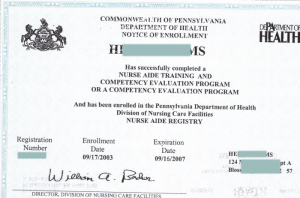How to become a Certified nursing assistant
There are four steps to becoming a CNA (certified nursing assistant):- Earn your high school diploma or GED;
- Complete a state-approved CNA training program (offered online or at hospitals, vocational schools, community colleges, The Red Cross and technical schools);
- Complete in-person clinical training; and,
- Pass a state-approved competency exam to get listed on your state’s CNA registry.
There are many academic, vocational, and technical colleges and universities that offer CNA training courses. The programs can be completed in one to two semesters, in a year, or in 18 months. CNA training programs can include lectures, demonstrations, testing, and practicum. Some programs require students to complete at least one internship while others do not.
CNA certificate programs are also available online. These programs consist of video lectures, audio lectures, quizzes, and exams. The programs are self-paced so students can complete them at their own pace. The courses may also be available in a hybrid format, so students have the option of completing online or in person.
How Long Does It Take to Become a CNA?
During most of the nurse assistant training programs, you’ll get at least 75 hours of classroom training, plus time learning the clinical skills you’ll need on the job. Check out the CNA job description to learn more.
Being a CNA: Here are some common questions—and totally honest answers about what it’s like to work as a CNA.
- 1
What exactly is a Certified Nursing Assistant?
What is a CNA? We’re glad you asked! The CNA is the backbone of health care. Most of the direct patient care in many health care settings is done by CNAs. Working as a team member, the CNA takes vital signs and helps patients bathe, dress, eat, and go to activities. Patients depend on CNAs to help them go to the bathroom and transfer from their beds to chairs. In short, just about everything that a patient needs, a CNA does. CNAs spend more time with patients than any other team members.
CNAs spend more time with patients than any other team members.
- 2
What else does a CNA do?
There is so much more to this job than you think. While CNAs are helping their patients, they are also observing them. Because CNAs get to know their patients so well, they are often the first to notice tiny changes that would escape anyone else: a little red spot on the hip, a favorite food untouched, a sudden weight gain. These can be significant red flags and need to be promptly reported.
- 3
What about all the “stuff” that needs to be cleaned up?
YesThe CNA changes diapers and wipes plenty of bottoms
We won’t lie to you. Being on the front line means being the person who takes care of inconvenient cleanups. Yes, the CNA changes diapers and wipes plenty of bottoms. We also wipe chins. But, you know what? We like helping our patients stay clean and fresh. We do it because they deserve to be treated with dignity and respect. They never expected this would happen to them. Someday, it could happen to any of us.
- 4
Do I need to be strong?
There is a physical requirement to succeed as a CNA. You don’t need to be an Olympic weightlifter, but you should be able to help a patient move in bed, stand, and transfer to a wheelchair with your support. You must know and use proper body mechanics to avoid injury to yourself and others. No one ever lifts or moves more weight than they should. That’s what co-workers are for. It’s called “teamwork!”
- 5
How much will I make? And will I get benefits?
$26,000the median salary for CNAs
We asked the same questions. According to the U.S. Bureau of Labor Statistics, the median salary for CNAs is about $28,530 per year. The benefits are great if you work full-time: paid vacation and holidays, medical insurance, and a 401(k) plan. Benefits can add up to 25% of your basic salary! Part-timers often get prorated benefits. Some places also offer tuition reimbursement and child care credits. Want to know what else is super? The job outlook for CNAs is brighter than for most other professions. By 2028, with more baby boomers needing assistance, job growth for CNAs will be 9%--almost double other occupations.
- 6
Are there any low points during the day?

Sure! Every day in every job has its low points. Sometimes we’re so busy we can hardly get a bathroom break. Some days, our best patients become childlike or depressed. And the patients that need more care… Well, they need even more care. We may want to pull our hair out, but we know tomorrow will be different. So we soldier on and do the best we can, helping our co-workers to get through the day. And we laugh together.
- 7
There must be some high points, too?
There are awesome days that make us glad we chose to become CNAs. Like when a patient learns to eat with a spoon again or take a step after a stroke. When a patient shares a story from the person’s past. When we get to hold a patient’s hand as the person passes away. When we make a patient feel happy to return to their perfectly made bed. When a family thanks us for being so attentive. Little moments, little successes. But they mean the world, and we treasure them.
- 8
What do I need to do to join the CNA ranks?
Great question! First, you should be at least 18 years old, although a few states allow 16- or 17-year-olds who have parental consent. A high school diploma or the equivalent is required. Next, you will need to find a CNA training program that is approved by your state. You will take courses in the classroom and in a clinical lab setting. After you pass the training program, you will be eligible to take the certification examination. CNA training programs are 4 to 12 weeks long. You’ll find them at a nearby community college or trade school. The American Red Cross also offers training in many states.
- 9
What happens after I pass the CNA program?
This is when things get exciting! Now you can apply for your certification. Each state has its own requirements for the examination: how to apply, what the cost will be, where the exam will be, and what to bring. Your school will tell you what to do.
- q
How can I prepare for my CNA examination?
Of course, you’ll want to review your notes and textbooks from your CNA program. Go over each area of basic skills, patient care, safety, and ethics. But that’s not enough. Rehearse every skill, from handwashing to vital signs to bedpan hygiene. Talk your way through each skill as if you were speaking to the patient and the proctor who grades your demonstration. And then get plenty of sleep the night before, eat a healthy breakfast, and don’t worry about a thing. You’re going to ace it!
To further hone your skills and assess your readiness for the CNA exam, take our comprehensive CNA practice test, designed to closely simulate the actual exam conditions. This practice test is an excellent way to prepare yourself and ensure you are well-equipped for the certification process.
- w
Any other advice?
Absolutely! Take our practice tests at cna.plus to review important information. Many of the questions are the same as those you’ll encounter when you take your examination. Each time you take one of our practice tests, the questions are shuffled, so they’re never in the same order twice. Plus, the site will give you an explanation for every single question to help you understand and remember the answer.
 By
By 



